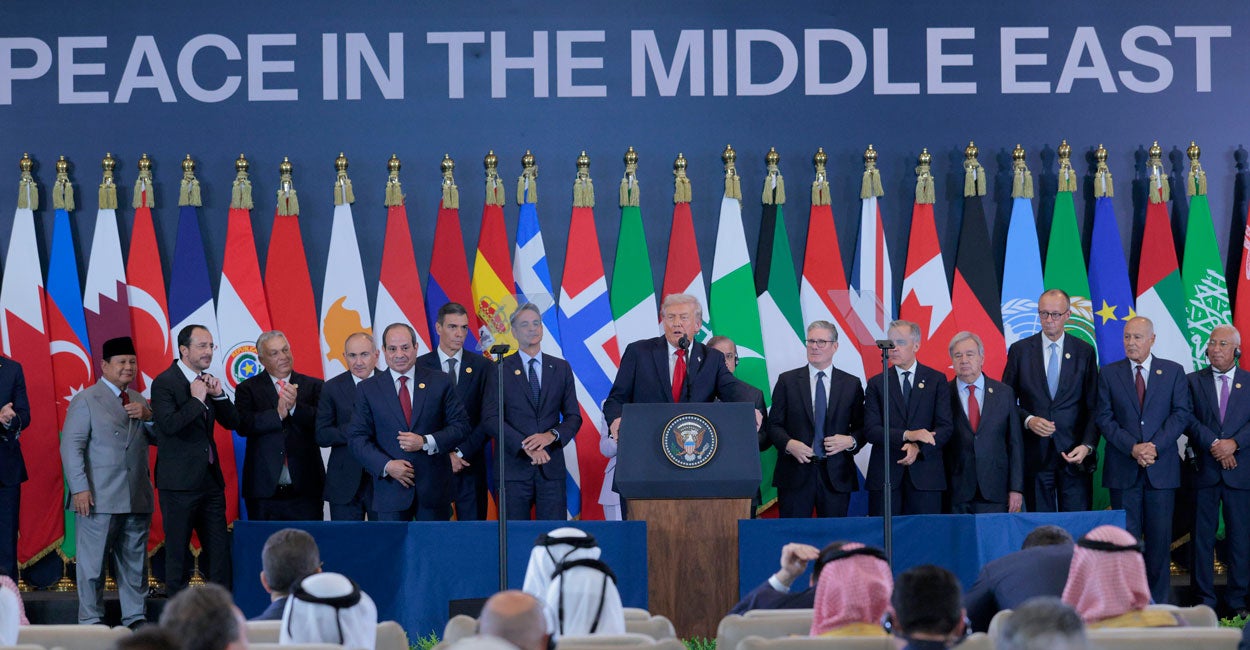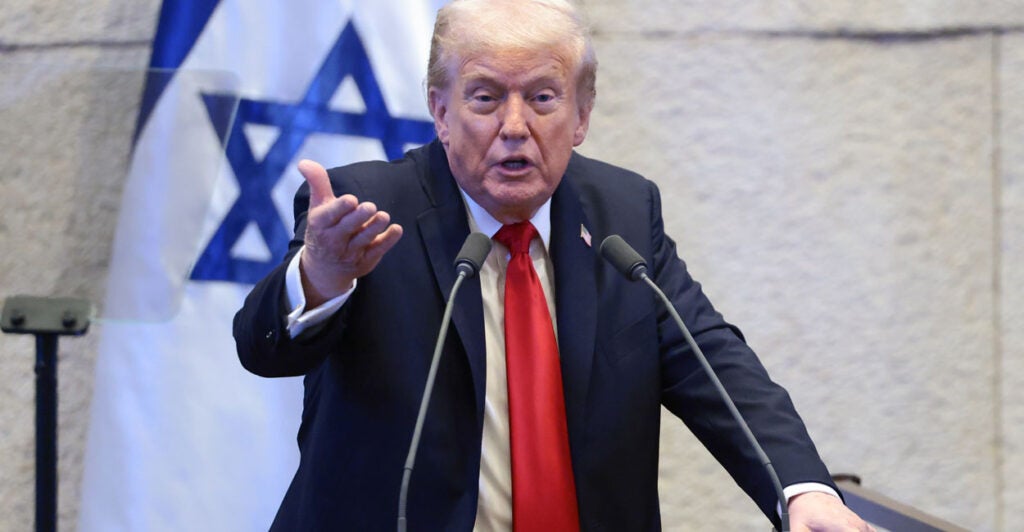


President Donald Trump cast his vision for a prosperous Middle East as he spoke before world leaders in Israel and Egypt.
Together, Israel and America will “build a legacy that all the people of this region can be proud of,” Trump said while standing before the Knesset, Israel’s parliament, only hours after the 20-remaining living hostages were set free after two years in Hamas captivity.
With a ceasefire holding between Israel and Hamas that the U.S. played a central role in brokering, and negotiations underway for a permanent end to the war, Trump called for lasting peace and collaboration in the Middle East.
“So instead of building fortresses to keep enemies at bay, the nations of this region should be building infrastructure to weave your commerce closer together, because you’ve got to compete with a big world out there in commerce,” Trump said.

“Instead of making weapons and missiles, the wealth of this region should flow to schools and medicine, industry, and frankly, the new hot thing, artificial intelligence,” the president continued.
The Abraham Accords is the central tool Trump spoke of to bring about collaboration and prosperity in the Middle East.
“It’s my firm hope and dream, frankly, that together, the Abraham Accords will turn out to be everything that we thought they would,” Trump said.
The Abraham Accords, which were signed during Trump’s first administration, normalized relations between Israel and four other nations, Morocco, Bahrain, the United Arab Emirates, and Sudan, although the agreement with Sudan has been affected by the Sudanese Civil War. The accords aim to foster peace and healthy trade relations between Israel and counties in the Middle East and North Africa, and are named after Abraham, a significant religious figure for Christians, Jews, and Muslims alike.
The nations who chose to join the Abraham Accords are now “among the most successful in the region,” Trump said as he urged additional counties to enter the agreement, a sentiment the president further stressed during the “Summit for Peace” held in Egypt Monday immediately following Trump’s visit to Israel.
Egyptian President Abdel Fattah el-Sissi greeted Trump in Sharm el-Sheikh, about 300 miles southeast of Cairo for the meeting that drew leaders from about two dozen nations, including Britain, Canada, France, Jordan, Iraq, Bahrain, Egypt, Quatar, and Turkey. Netanyahu did not participate in the summit due to a Jewish holiday.
Trump described the participating nations as “among the most powerful counties in the world,” and the “richest.”
“We have achieved together in recent days a change that really is historic, and it’s going to be remembered forever,” Trump said of the peace deal between Israel and Hamas which mediators from Egypt, Quatar, Turkey, and the U.S. led the way in negotiating.
“The momentous breakthrough that we’re here to celebrate tonight is more than the end of the war in Gaza, it’s, with God’s help, it’ll be the new beginning for an entire beautiful Middle East,” Trump said.
Trump urged the nations in the region to “join the Abraham Accord,” telling world leaders there is now “no excuses.”
“We don’t have a Gaza, and we don’t have Iran as an excuse. That was a good excuse, but we don’t have that anymore,” Trump said.
Discussions of peace and greater collaboration in the Middle East come about four months after the U.S. crippled Iran’s nuclear program, which posed an immediate threat to Israel and region, through three major targeted strikes.
“All the momentum now is toward a great, glorious, and lasting peace, and our commitment to fulfilling the 20-point plan we developed together will be the crucial foundation for achieving that bright future,” the president said.
Trump proposed a 20-point plan to end the war in Gaza in early October. Israel immediately agreed to the plan and Hamas accepted parts of the plan, leading to the ceasefire and hostage deal.
The subsequent phases of the peace deal are “being worked on right now as we speak, and we’re actually in stage three and four,” Trump said.
Trump and world leaders are expected to work together on long-term goals for a stable government in Gaza through a “Board of Peace.”
“We’ve all agreed that supporting Gaza must be done to lift up the people themselves, but we don’t want to fund anything having to do with bloodshed, hatred, or terror,” Trump said, adding, “We’re going to make sure that the Middle East is going to be a safe and secure place.”
Related posts:
- WATCH: Trump Responds to Hamas Accepting Part of His Peace Plan
- Families of Hostages Hopeful, ‘Sense a Shift’ on 2nd Anniversary of Oct. 7 Attack on Israel
- Israeli Government Calls for Trump to Receive Nobel Peace Prize

For the reason that the admin of this site is working, no uncertainty very quickly it will be renowned, due to its quality contents.